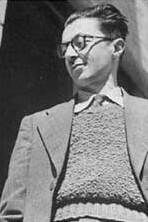Sadegh Hedayat
Sadegh Hedayat ( Persian صادق هدایت Sādeq Hedāyat ; * February 17, 1903 in Tehran ; † April 9, 1951 in Paris ) was an Iranian writer .
Life
Sadeq Hedayat was born in 1903 into a respected aristocratic family. His great-grandfather, Mirza Reza Qoli Khan Hedayat (1800–1871), was a well-known historiographer, poet and educator of princes in 19th century Iran. From 1914 Sadeq attended the " Dar-ol Fonun " high school in Tehran. However, due to an eye disease, he had to leave after just one year. Then he attended the French mission school St. Louis in Tehran and got to know the French language and literature . In 1925 he went to Belgium for a study visit with a group of students , but always complained about the weather and his study problems. Hedayat later moved to France, where he stayed from 1926 to 1930. He changed both the subject and the place of study several times in a short time. Depressed and plagued by self-doubt, he attempted suicide in the Marne River in 1929 . However, he was rescued by passers-by who were there in a boat. He returned to Iran without a degree and in the same year began to work for the Iranian People's Bank as an employee. During this time, together with Bozorg Alavi , Masud Farzad and Modschtaba Minavi, he founded the Rab'eh ( Fours ), a small group “of writers, painters and actors who sought a renewal of Persian art”.
He has translated works by Guy de Maupassant , Anton Chekhov , Rainer Maria Rilke , Edgar Allan Poe , Arthur Schnitzler , Jean-Paul Sartre , Franz Kafka and the musicologist Gaston Sarreau . He also wrote two historical dramas , several short stories , a play and a travelogue ; He also made various translations from Middle Persian into New Persian . He wrote his masterpiece, the short novel “ Blinde Eule ”, in 1936/37. It begins with the sentence: “There are wounds in life that, like leprosy, slowly drain the soul in solitude.” The book tells of strange emotional situations and of people who are even more strange. All of them give the reader a kind of trepidation of deep experiences. This novel is one of the most important works of the modern Persian language. Hedayat committed suicide in Paris on April 8 or 9, 1951 and was buried in the Père Lachaise cemetery there.
Works
- Novels and short stories:
- The Legend of Creation (3 short stories), 1930 and 1960.
- Buried Alive (8 Short Stories), 1930.
- Mongol Shadows , 1931.
-
Three drops of blood (“Seh ghatreh chun”), 1932.
- from it: In front of the tea house. Translated into German by Touradj Rahnema and Werner Bönzli. In: die horen 26 (1981), 2, pp. 61-67.
- Twilight , 1933.
- Karawane Islam - The Islamic Mission in Europe; A satire , 1933/34.
- Madame Alavie-e (7 short stories)
- Mister Wau Wau
- The blind owl , 1937.
- The Wandering Dog , 1942.
- Chatty , 1944.
- The elixir of life ( Āb-e zendegi )
- Hajji Aqa , 1945.
- Pearl cannon , 1947.
- Dash Akol
- Dramas (1930–1946):
- Parvin, the daughter of Sassan , 1930.
- Mazi-yar (play)
- The fable of creation
- Travel description:
- Isfahan , half the world
- On the damp path, 1935 (not printed)
- Miscellings:
- Rubāyyāt-e Hakim Omar-e Khayyam. ( Khayyāms quatrain ), Tehran 1923.
- Man and Animal , 1924.
- Death , 1926.
- The Usefulnesses of the Vegetarian Lifestyle , 1957.
- A Meaningful Story , 1932.
- Khayyam's Melodies , 1934.
- Tchaikovsky , 1940.
- Via Assadi's Persian Dictionary , 1940.
- New literary research method , 1940.
- New trend in Persian poetry
- Review of Gogol's translation into Persian (Inspector General, Nikolai Gogol ) , 1944.
- Some remarks on Wis and Ramin , 1945.
- Kafka's message , 1948.
Autobiographical about Sadegh Hedayat
- MF Farzaneh: Rencontres avec Sadegh Hedayat. Le Parcours d'une Initiation . José Corti. Paris 1993.
literature
- Eberhard Krüger: On the relationship between author and work in the modern Persian narrator Sadeq Hedayat . (Islamic Studies 42) K. Schwarz, Freiburg im Breisgau 1977, ISBN 3-87997-055-6 (also Diss. Univ. Munich)
- Hassan Kamshad: Modern Persian Prose Literature . Cambridge, Cambridge University Press, 1966 (again: Iranbooks, Bethesda, Maryland 1996, ISBN 0-936347-72-4 )
- Ehsan Yarshater (ed.): Sadeq Hedayat: An Anthology . Bibliotheca Persica, New York 1979.
- Navid Kermani : The order of literature: Hedayat and Kafka in: Between Koran and Kafka. West-east explorations , CH Beck, Munich 2014.
- Fakhrezzaman Schirazi-Mahmoudian: Literary use of Persian terms and idioms in the works of Ṣādeq Hedāyat: a compendium , Harrassowitz, Wiesbaden 1999, ISBN 978-3-447-04169-0 .
Web links
- Literature by and about Sadegh Hedayat in the catalog of the German National Library
- Link with works by Sadegh Hedayat in English translation & interpretations of the Blind Owl (Iraj Bashiri) (English)
- Entry of the French Édition Corti on Hedayat (French)
- Genealogy of Hedayat family (English)
Individual evidence
| personal data | |
|---|---|
| SURNAME | Hedayat, Sadegh |
| ALTERNATIVE NAMES | Hedayat, Sadeq |
| BRIEF DESCRIPTION | Iranian writer |
| DATE OF BIRTH | February 17, 1903 |
| PLACE OF BIRTH | Tehran |
| DATE OF DEATH | April 9, 1951 |
| Place of death | Paris |

